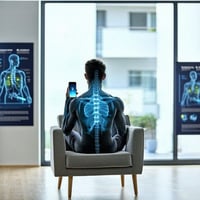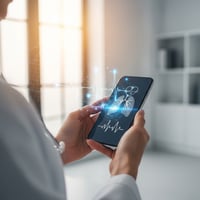In the evolving landscape of chronic respiratory care, the integration of technology into patient...
Revolutionizing Clinical Studies with Remote Data Collection Technology
In the rapidly evolving landscape of healthcare, the ability to collect clinical study data remotely has opened new frontiers in patient care and research methodologies. Imagine a scenario where a patient, from the comfort of their own home, participates in a critical stress study, contributing invaluable data without the need for in-person visits. This is not a glimpse into the distant future but a present reality made possible by technologies like the SmartSpectra Software Development Kit (SDK). This tool enables the collection of vital signs directly from participants' smartphones, marking a significant leap in how we approach clinical studies.
The SmartSpectra SDK specifically caters to the collection of heart rate (HR) and respiratory rate (RR) through smartphones, offering a promising avenue for non-invasive, contactless health monitoring. For a 30-second spot check, the SDK boasts impressive accuracy metrics, with a root mean square deviation (RMSD) of 1.95 beats per minute (bpm) for heart rate and 2.25 bpm for respiratory rate. These figures not only demonstrate the SDK's reliability but also underscore its potential utility in monitoring wellness and conducting non-diagnostic health assessments in large-scale clinical studies.
However, the implementation of such technology comes with its own set of challenges and considerations. Participants need to be adequately trained to ensure the data collected is of high quality. Whether this training is conducted in person or through in-app guidance, the goal is to maximize the percentage of valid measurements. Given the current estimation that only about 60% of attempts may return a valid measurement, the importance of clear, accessible instructions cannot be overstated. Moreover, this system is not designed to capture irregular heart rhythms, a limitation that researchers must account for in their study designs.
Ensuring robust consent and stringent data security procedures is another critical aspect of deploying the SmartSpectra SDK in clinical studies. Participants must be fully informed about how their data will be used, and researchers must adhere to the highest standards of data protection to maintain trust and integrity in the process.
Despite these challenges, the benefits of remote data collection in clinical studies are substantial. This technology can significantly reduce the barriers to participation, making it easier to gather diverse data sets that are more representative of the broader population. Furthermore, by allowing participants to remain in their natural environments, researchers can collect more realistic data that might better reflect real-world outcomes.
Looking ahead, the use of SDKs like SmartSpectra in contactless health monitoring represents a promising advancement in medical research and patient care. As we continue to refine these technologies and address their limitations, we can anticipate a future where remote clinical studies become a standard part of our healthcare ecosystem. This will not only enhance our understanding of various health conditions but also pave the way for more personalized, accessible, and efficient patient care. With a commitment to clinical accuracy, patient privacy, and evidence-based approaches, the potential to revolutionize healthcare through technology like the SmartSpectra SDK is within our grasp.
AUTHOR BIO





